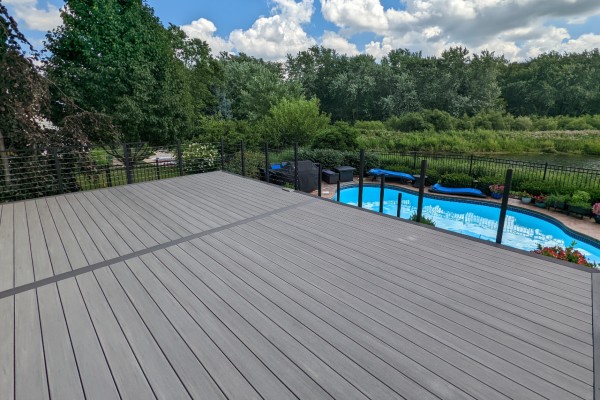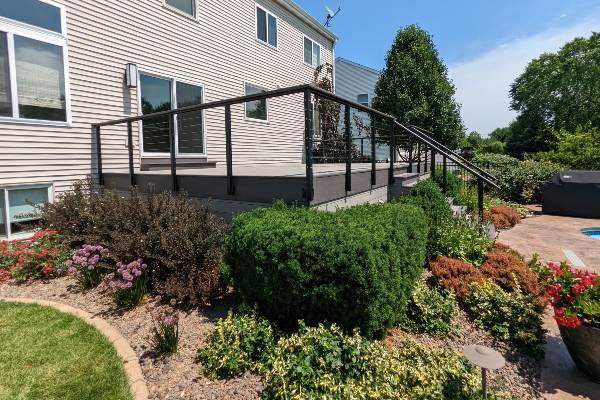In this article, we will discuss factors that affect the overall price of a deck and how much you can realistically expect to invest when creating a new outdoor living space.

Composite Decking: Factors that Affect Price
- Size of Deck: How big of a deck do I need? One of the biggest factors that affects the price of your deck is the square footage. Determine how you plan to use your deck and consider the size you would like your deck to be.
- Angles and Layout of Deck: When thinking of your new space, consider the furniture and how you want your new outdoor living space to feel. The more angles or curves your deck includes the more intricate the project becomes.
- Obstacles on Jobsite: In some cases landscaping, trees, electrical and plumbing services may be an obstruction on the jobsite. In other cases vents, electrical outlets, windows, or water spigots may also be in the way of where the deck will be installed which can alter the efficiency of your deck project.
- Demo of existing structure: A deck has an expected life span of 15-20 years. If your existing deck is around that time frame, you may need to budget for the demolition and disposal of your existing structure.
- Deck Amenities: Building a new deck is much like buying a car. The many features that can be added to enhance your deck and outdoor living experience is endless. It is important to consider amenities because in some cases these features can dictate how the deck will be built.
A few of the amenities that can be added to your new deck include the following:
- Deck Lighting
- Glass Railing
- Outdoor Kitchen
- Louvered Roof/Pergola
- Retractable/Fixed Screen (Enclosed Area)
- Hot Tub and Jacuzzi
- Sound System
- Storage Solution
- Drainage System underneath Deck
- Drink Rail/Bar
- Cooling Fan
- Heaters and so much more!
- Choice of Railing: Railing is a part of the deck project that is most commonly overlooked. When building a new composite deck we recommend using a railing that will not only look great but will also be a low maintenance solution for your deck. The most common types of railing include composite, vinyl, and aluminum. If you are looking for a more contemporary look or looking to preserve the view from your deck, you may also consider cable railing or glass panel railing.
- Permits: The permitting process is subjective to each city or township. Every location has a different set of fees and a different timeline for processing permit applications. Certain locations may require drawings that are stamped by a licensed Architect or Structural Engineer.
- Height of Structure: The height of your deck can influence your price for a few key reasons:
Installation Efficiency: When building a second story deck, efficiency of the project is slowed down. Depending on the size of your deck, equipment such as scaffolding, and ladders may be needed. In some cases, if bigger beams or posts are needed, heavy equipment such as a skid loader or even a crane may be necessary. A second story deck often includes more possibilities for outdoor living space. - Future Plans: Within the process of planning out your new outdoor living space please keep in mind that in most cases not everything has to be done at once. Whether you’re still indecisive or budgeting your spending, when you plan ahead it benefits you in the long run. For example, if you build a new deck one year and you were wanting a Louvered Roof but the timing at the moment wasn’t right, know that having those future plans set in place will save you time and money. Moving forward, your outdoor living team from the year before will know the exact layout of your deck and be able to install your Louvered Roof efficiently without having to go through all the obstacles if you hadn’t planned ahead.
- Stairs: Stairs are often the most expensive part of a deck. A higher deck means more stairs and more railing. When a deck is elevated from time to time it is necessary to create landings halfway down for support and for safety purposes.
- Height of Structure: The height of your deck can influence your price for a few key reasons:
- Contractor you select: In the construction industry, there are many types of contractors that COULD build you a deck. An independent contractor such as a handyman or carpenter are typically well suited to build you a new deck within a more economical price. A general contractor has the capability of developing your new deck within your vision but based on their specialty, backyards can typically be overlooked or neglected. An outdoor living specialist has their focus on your backyard and creates a smooth transition within your indoor and outdoor living space. A general contractor and outdoor living specialist will more often be on the higher price point but they generally offer a one stop shop solution. A company that specializes in decks and outdoor living will be more capable and open to custom projects with elaborate designs and additional features.

We understand that pricing can be a tough/interesting/unknown topic but here are ways to have control over and know the why behind the pricing of your new deck.
Whether you hire a handyman, carpenter or general contractor an outdoor living specialist has one scope of work. A general contractor would hire specific trade contractors to do the work. A carpenter may only handle your deck but may not be able to handle amenities that include plumbing or electrical. A company that specializes in decks and outdoor living is often trained and equipped to install beautiful decks and will be more capable of doing custom projects with elaborate designs and additional features. In many cases these companies will use third party trade companies to do part of the work but generally understand how the systems and products work.
- PVC and composite vs wood
- Turn-Key outdoor living packages
- Lifetime cost of ownership associated with each type of deck
- Why are PVC and composite decks so Durable?
- Why are composite and PVC decks so efficient

